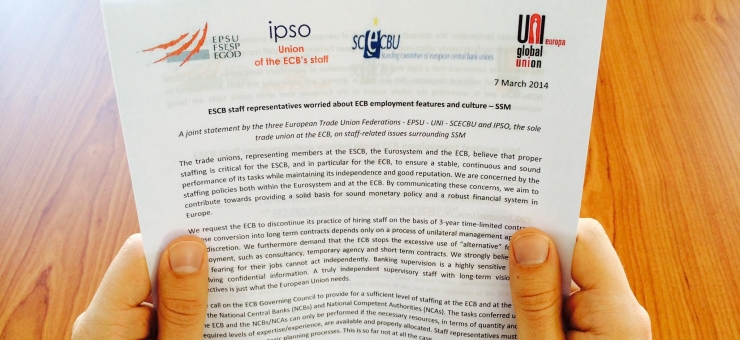ESCB (European System of Central Banks) staff representatives worried about ECB employment features and culture

A joint statement by the three European Trade Union Federations - EPSU - UNI - SCECBU and IPSO, the sole trade union at the ECB, on staff-related issues surrounding Single Supervisory Mechanism (SSM)
The trade unions, representing members at the ESCB, the Eurosystem and the ECB, believe that proper staffing is critical for the ESCB, and in particular for the ECB, to ensure a stable, continuous and sound performance of its tasks while maintaining its independence and good reputation. We are concerned by the staffing policies both within the Eurosystem and at the ECB. By communicating these concerns, we aim to contribute towards providing a solid basis for sound monetary policy and a robust financial system in Europe.
We request the ECB to discontinue its practice of hiring staff on the basis of 3-year time-limited contracts whose conversion into long term contracts depends only on a process of unilateral management appraisal and discretion. We furthermore demand that the ECB stops the excessive use of “alternative” forms of employment, such as consultancy, temporary agency and short term contracts. We strongly believe that staff fearing for their jobs cannot act independently. Banking supervision is a highly sensitive matter involving confidential information. A truly independent supervisory staff with long-term vision and objectives is just what the European Union needs.
We call on the ECB Governing Council to provide for a sufficient level of staffing at the ECB and at the level of the National Central Banks (NCBs) and National Competent Authorities (NCAs). The tasks conferred upon the ECB and the NCBs/NCAs can only be performed if the necessary resources, in terms of quantity and of required levels of expertise/experience, are available and properly allocated. Staff representatives must be involved in these strategic planning processes. This is so far not at all the case.
Furthermore, as employees of central banks, we are worried about the impact that this new process could have. All central banks have to maintain and enforce their own independence, their duties and their territorial network. We should not forget the principle of decentralisation, established for the Eurosystem.
The Statute of the ESCB and the ECB empowers the Governing Council to lay down and to amend the rules applicable to staff in full independence and autonomy. This regime includes not only labour law but also collective bargaining, rules regarding social security, staff’s right to communicate, staff’s personal investment choices, etc. In order to be aligned with its corporate value of fostering transparency, the ECB should disclose all elements of its law making in the field of labour law to the European public.
Workload at the ECB is structurally high. Despite continuously increasing work pressure, due to more and more tasks and responsibilities, the Governing Council has repeatedly refused to significantly increase the headcount at the ECB. For the SSM the adequacy of the staffing remains to be seen. We invite the ECB’s Executive Board and the NCB Governors, members of the ECB Governing Council, to recognise this untenable situation, which may also put the entire SSM project at risk. There are conflicts of interests among the NCBs and the ECB. The NCBs are the shareholders of the ECB and, at the same time, they are competitors in terms of carrying out tasks. Furthermore they participate in the governance of the ECB from
Page 2 of 2
a Eurosystem perspective. We demand a stepping up of transparency and a process to be established to address these conflicts openly which involves the European Parliament and staff representatives.
The unions are concerned that a high degree of concentration of supervisory tasks within the ECB could emerge without sufficient resources. We see risks in ignoring and underusing the skills accumulated in NCBs/NCAs and in weakening the whole system at the European level while public tasks are being outsourced at the same time to private firms.
Contacts:
EPSU, Wolfgang Hermann, Tel. +49‐1736658382, e‐mail hermann@ipso.de
IPSO, Emmanuel Larue, Tel. +49‐69‐1344‐7036, e‐mail: emmanuel.larue@ecb.int
SCECBU, Thierry Desanois, Tel. +33‐615023169, e‐mail: thierrydesanois@gmail.com
UNI‐Europa Finance, Oliver Roethig, Tel. +32‐479072224: e‐mail: Oliver.Roethig@uniglobalunion.org

